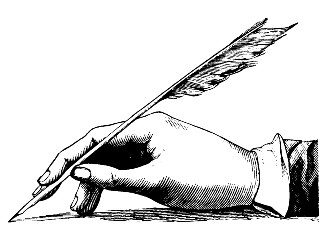From a novel I recently wrote, comes this passage (that I've modified for this lesson):
Phillip held the gun's grip in his hand, his finger on the trigger. His palms were sweating and his heart was beating hard. He looked down the ally, concentrating.
The zombie surprised him, coming from behind some boxes and moving fast. Phillip, startled, shot twice almost without thinking. It probably saved his life as the zombie cried in pain and blood leaked from its body. That also stopped it long enough for Phillip to shoot it in the head twice resulting in more blood.
There are three things you can do to punch up your writing: 1) use "power words" and "power phrases," 2) use adverbs to modify verbs, and 3) use adjectives to modify nouns in both cases to convey emotion, feeling, or paint a picture.
What are power words and phrases? "Power words" and "power phrases" are words or phrases that don't just tell what happened but show and tell and often relate a feeling. You want your reader to see, hear and feel with your characters. For example:
Joe tripped and fell.
Or:
Joe stumbled and was slammed to the pavement.
("Stumbled" paints a picture and "slammed" is a power word, much more visual and evocative than "fell" and then "to the pavement" again paints a picture.)
And if we add rule #2 above (adverbs):
Joe stumbled and was slammed painfully to the pavement.
(For some reason I like that better then "painfully slammed" I think because first you get the "slam" then you get the "pain.")
And rule #3 is added:
Joe stumbled and was slammed painfully to the hard, cold pavement.
(Don't worry that it's now twice as long, your reader won't care if it's written well.)
So let's looks at the paragraph above (about Phillip and the zombies) as I actually wrote it (changes are in strike out and bold):
Phillip held clutched [power word] the gun's black plastic [adjectives] grip hard [adverb] in his hand, his finger on the trigger. His palms were sweating and his heart was beating hard trying to jump out of his chest [power phrase]. He looked peered [power word] down the dark [adjective] ally, concentrating.
The zombie surprised him, coming from behind some boxes and moving fast with alarming speed [power phrase]. Phillip, startled, shot twice almost without thinking. It probably saved his life as the zombie cried roared [power word] in pain and black [adjective] blood leaked mushroomed [power word] from its pale [adjective] body. That also stopped it long enough for Phillip to shoot it in the head twice resulting in more blood a spray of dark viscera [power words (spray and viscera) and adjective (dark)].
And if you want to read that clean, here it is:
Phillip clutched the gun's black plastic grip hard in his hand, his finger on the trigger. His palms were sweating and his heart was trying to jump out of his chest. He peered down the dark ally, concentrating.
The zombie surprised him, coming from behind some boxes and moving with alarming speed. Phillip, startled, shot twice almost without thinking. It probably saved his life as the zombie roared in pain and black blood mushroomed from its pale body. That also stopped it long enough for Phillip to shoot it in the head twice resulting in a spray of dark viscera.
Compare and contrast to the first version of the paragraph. They both tell the same basic story. But one tells the story much more emotionally and vividly.
Class dismissed.


No comments:
Post a Comment